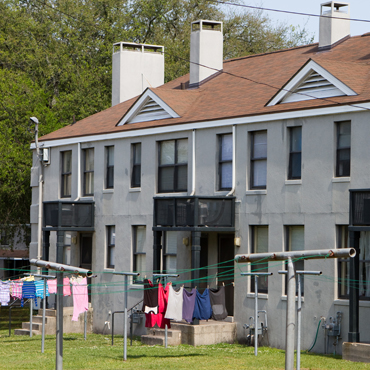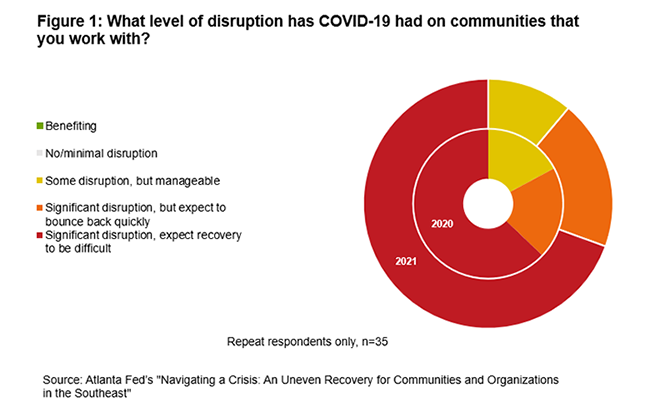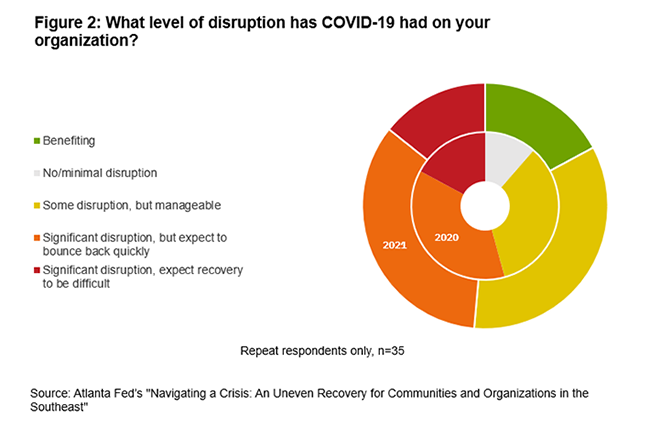
Two years after the onset of COVID-19, communities and community development organizations are navigating a difficult recovery, as many of them struggle to find stability. Across many dimensions, the COVID-19 pandemic has highlighted and deepened existing inequalities that disadvantage low- and moderate-income communities (LMI) and communities of color that experience chronic disinvestment. As a result, organizations that serve these communities have had to pivot and find innovative ways to deliver services to provide relief to both the communities and their own staffs.
Compounded with the shock of COVID-19 are the persistent stressors of everyday life for many individuals and communities that are affected by systemic racism. For example, Blacks and Latinos are more likely to live in high-poverty neighborhoods due to practices such as redlining that led to race-based residential segregation.1 Further research suggests that geographies with higher populations of Black residents have had higher rates of COVID-19 compared with other racial groups.2
Partners Update provides key takeaways of a recent special report published by the Atlanta Fed's Community and Economic Development team. It is a part of our ongoing effort to monitor how COVID-19 is affecting both communities and organizations that serve LMI and communities of color in the Atlanta Fed's Sixth District.
The perspectives offered here were shared with the Atlanta Fed's team during a series of interviews with community development organizations contacts across the six southeastern states (Alabama, Florida, Georgia, Louisiana, Mississippi, and Tennessee) in our district in July and August 2021. These interviews were a follow-up to an initial series of interviews conducted in April 2020 and allow us to gauge how the experiences of communities and organizations across the Southeast evolved roughly one and a half years into the pandemic.
As reflected in figure 1, more respondents saw the disruption caused by the pandemic to be more severe on the community level in 2021 relative to initial responses in 2020. Outlooks were more mixed when respondents evaluated the disruptions their organizations faced. As illustrated in figure 2, a growing portion of respondents stated that their organization had benefited, faced no or minimal disruption, or faced some manageable disruption from 2020 to 2021. However, of the organizations that did experience significant disruption, a larger portion of respondents expected recovery to be difficult in 2021 compared to the initial survey in 2020.


The following sections present key findings and takeaways from our interviews.
Safety net programs provide relief for some, but not for all
Challenges to housing stability existed before the pandemic. Our contacts discussed that relief programs such as mortgage forbearance, emergency rental assistance, and the federal eviction moratorium were "lifelines" for many of their constituents. However, that has not been the case for all. A study by the Federal Reserve Bank of Philadelphia estimated that the rental debt of households that experienced job loss or involuntary part-time work during the pandemic averaged $7,800.3 One contact mentioned that some clients have experienced significant rent debts of up to $25,000, which is more than three times the Philly Fed's estimated national rent debt average. Challenges still exist with hard-to-reach populations such as rural communities and non-native English speakers, refugees, and immigrants. Overall, concern was expressed around increased housing instability as pandemic-era safety net programs expire.
Recovery for low-wage and frontline workers has been slow, particularly in the hardest-hit industries such as tourism and retail. These low-wage workers face compounding risks of higher COVID exposure and less financial stability, and are likely to be Black, Indigenous, or people of color (BIPOC), as they make up approximately 40 percent of all low-wage workers.4 Contacts also noted the multifold challenge of childcare. Childcare is an essential need for working families. Many individuals are unable to return to work without this support. However, contacts mentioned that some childcare centers struggle to find staff and teachers at the wages they offer.
Trauma and mental health are persistent stressors
According to our contacts, communities and organizations in the Southeast are experiencing increased trauma and negative mental health outcomes. The disruption of COVID-19 alongside other stressors such as systemic racism has affected individuals' ability to navigate relief programs successfully. One contact noted that many of their clients have been overwhelmed by national tragedies such as the murder of George Floyd and other violent incidents in nearby southeastern communities such as the Atlanta spa shootings and the death of Ahmaud Arbery near Brunswick, Georgia.
In our interviews, there were several instances of organizations' BIPOC staff experiencing burnout and exhaustion. Organizations acknowledged that they could build muscle to be good employers and change agents. Some leaders didn't fully realize the toll of the emotional and physical stress of the unrest and the pandemic until they saw how their staff were affected. For these leaders, the social unrest highlighted the need to create space to have conversations, build effective infrastructure to support staff needs, and avoid perpetuating harmful practices. As leaders assess their organizations, one respondent looked internally and found senior leadership did not represent the community. They are working on succession planning and diversity as well as representing non-English-speaking communities. Some organizations are working to develop the appropriate infrastructure to support staff and clients.
Addressing systemic racism
Contacts from across housing, workforce development, and other community development services noted that staff have begun to respond to the urgent need to examine systemic racism to advance racial equity in their communities. Examples include increased training that focuses on diversity, equity, and inclusion (such as addressing anti-Blackness and colorism) and leveraging local partners to increase awareness. However, these efforts present challenges, as face-to-face engagements are limited due to risks of the virus.
Opportunities to scale and sustain new funding and infrastructure
Many of our contacts successfully pivoted to virtual and hybrid service delivery models due to the pandemic. Several nonprofits noted that they've received an increase in existing funding or new funding sources to support investments in their remote technology. Many staff members also prefer flexible work schedules. One organization acknowledged that additional investments in their remote infrastructure will be ongoing due to the need to accelerate their progress and the efficiencies they have experienced. For example, one contact described that their agency was behind on their technology, and they are learning to adopt new technologies to meet staff needs as well as improve their organization's ability to cope with potential future shocks to their expanding service delivery models.
While the new funding has expanded the capacity for some agencies to better meet community needs, others expressed concern regarding the sustainability of these funds. With the increased attention on advancing racial equity, some leaders believe that giving may be short-term, which may have implications on their ability to make continued investments that target BIPOC communities. Even with the availability of these and other funds, the lack of capacity to deploy these funds effectively continues to be a pressing challenge. As one respondent shared, they were only able to deploy one-third of the recovery funds they received within the time frame they were allowed.
One respondent said that most of the assistance they received came with restrictions as to who could access the funding. Many of the families they served were excluded, and the organization used its own funds to assist families.
Toward an inclusive recovery
COVID-19 will have long-term impacts across the nation. The uneven recovery among organizations and communities in the Southeast illustrates the persistence of deep-seated disparities that LMI and BIPOC communities face. As communities continue to find pathways to recovery, there is an urgency to prioritize the needs of historically marginalized groups where race is no longer a predictor of life outcomes. Interview subjects also identified the importance of centering racial equity in recovery efforts across housing, workforce, health, and other social dimensions in order to combat these disparities and prevent them from deepening.
Here are two recent Federal Reserve resources that explore the topics of advancing racial equity and targeted approaches to an inclusive recovery, which are critical to promoting economic mobility and resilience:5
- • Racism and the Economy: A series of videos and supporting materials hosted by all 12 Federal Reserve Banks dedicated to understanding the implications of structural racism in America's economy and advancing actions to improve economic outcomes for all. Recordings are available.
- • Inclusive and Resilient Recovery: An Atlanta Fed webinar series that seeks to amplify and codevelop actionable COVID-19 recovery strategies that center racial equity as their ultimate outcome.
Moving forward
As the impact of COVID-19 unfolds, the Atlanta Fed's Community and Economic Development program remains committed to identifying opportunities to work with policymakers, practitioners, funders, and researchers to support efforts that achieve economic mobility and resilience in communities. If you would like to learn more or have questions, please contact Dontá Council at donta.council@atl.frb.org or Grace Meagher at grace.meagher@atl.frb.org.
By Dontá Council, CED adviser, Grace Meagher, CED research analyst I, Janelle Williams, CED senior adviser, and Ann Carpenter, CED assistant vice president. The views expressed here are the authors' and not necessarily those of the Federal Reserve Bank of Atlanta or the Federal Reserve System. Any remaining errors are the authors' responsibility.
_______________________________________
1 Greene, Solomon, Margery Austin Turner, and Ruth Gourevitch. August 29, 2017. "Racial Residential Segregation and Neighborhood Disparities." US Partnership on Mobility from Poverty.
2 Gravlee, Clarence C. August 4, 2020. "Systemic Racism, Chronic Health Inequities, and COVID‐19: A Syndemic in the Making?" American Journal of Human Biology 32(5).
3 Reed, Davin, and Eileen Divringi. July 30, 2021. "Household Rental Debt during COVID-19: Update for August 2021." Federal Reserve Bank of Philadelphia.
4 Ross, Martha, and Nicole Bateman. November 2019. "Meet the Low-Wage Workforce." Brookings Institution.
5 Bostic, Raphael. June 12, 2020. "A Moral and Economic Imperative to End Racism." Federal Reserve Bank of Atlanta.


